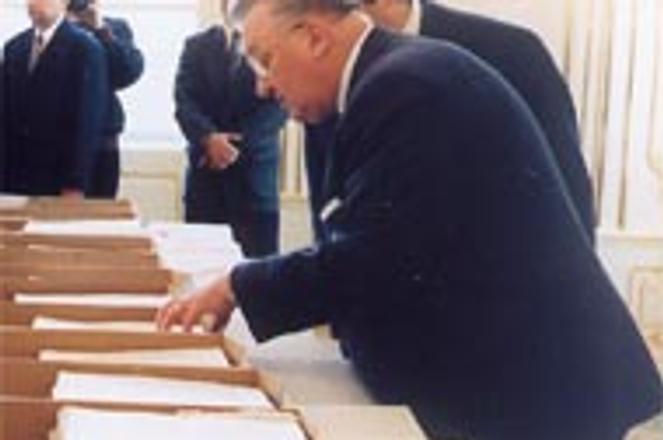If at first you don't succeed, vote, vote again. President Michal Kováč examines petition signatures last April.Peter Brenkus
With less than two weeks left as President of Slovakia, Michal Kováč has ignited a political firestorm in Slovakia by calling an April 19 re-run of last May's botched referendum on direct Presidential elections and NATO membership.
The decision, handed down by Kováč on February 20, has been praised by opposition deputies as a brave defence of the fundamental rights of Slovak citizens, rights which the Constitutional Court (CC) said on February 6 were violated by the Interior Ministry last year. Government deputies, meanwhile, said Kováč's decision was vindictive and illegal, and that the results of the referendum would not legally bind Parliament to enact them.
"In deciding to set [Sunday April 19 as] a new date for the referendum I took into account fundamental legal principles, especially those of democratic countries, which are enshrined in the Constitution of the Slovak Republic and highlighted by the decisions of the Constitutional Court as holding the highest legal value," wrote Kováč. "That means that the right of citizens to participate in [the referendum called for May 23 and 24, 1997] still exists, because it is [as a fundamental right] inalienable, irrevocable and permanent."
"[Calling a new referendum] was the empty gesture of a departing official," said SNS vice chairman Anna Malíková, adding that the results of the referendum would carry the weight of a mere recommendation for Parliament, because according to the Constitution, the President can only be elected by a 90-vote majority in Parliament.
"I am sorry [about this decision], because he could have left his post peacefully," said Tibor Cabaj, chairman of HZDS deputies' club. "He is going in this way [by calling a new referendum], and a stink still remains behind him."
But Mikulaš Dzurinda, spokesman for the opposition SDK coalition, called Kováč's move "a victory for law and constitutional rights." Ivan Šimko, KDH vice-chairman, praised Kováč's decision as "an expression of consideration towards the citizens and their basic constitutional rights."
Legal uncertainties
On the same day that Kováč issued his proclamation, General State Prosecutor Michal Vaľo issued a statement that cast doubt on the legality of Kováč's decision. Kováč "has not fulfilled his constitutional responsibilities" because he has never submitted a "grievance against the validity of the (previous year's) referendum to the Constitutional Court," Vaľo wrote, "and according to our legal standards, the called May (1997) referendum is still valid. That's why it can't be rerun."
But other legal analysts have pointed out that the President has legal precedent on his side in calling another referendum. A CC verdict, dated January 15, 1994, said that the northern Slovak town of Starý Smokovec had violated the fundamental rights of its citizens in failing to hold a planned referendum on the separation of the municipality of Tatranská Lomnica from its jurisdiction.
In explaining its findings, the court added the crucial lines that "an obligation toÉhold a vote on the separation of the municipality of Tatranská Lomnica is still in force, because fundamental rights and freedoms are, according to [the Constitution] inalienable, irrevocable and permanent."
The possibility of re-running the referendum was suddenly raised in recent weeks by a February 6 CC ruling in favor of Šimko, who had accused the Interior Ministry of violating his constitutional rights by marring the May 1997 referendum on direct Presidential elections and NATO accession.
Legal analysts said that the CC's finding in the Šimko case implied that the ministry had violated the rights of all Slovak citizens, and that the President now had the power to restage the botched referendum. But government deputies argued that the verdict carried no such implications beyond Šimko's individual case.
"The recent decision of the Constitutional Court strengthened my opinion that [the Court] is another sick element on the Slovak political scene," said Ján Cuper, a legal expert with the HZDS. "The CC only said that Šimko couldn't exercise his right to participate in the referendum."
However, according to Ján Čarnogurský, KDH chairman, the CC ruling implied that by marring the referendum of May 23-24, 1997, the government had acted against the will of all Slovak citizens. He added that the verdict also implied that Slovak Interior Minister Gustáv Krajči, who had personally taken responsibility for the ministry's actions between May 21 and May 24, had committed a criminal act and should be prosecuted for it.
"The Interior Ministry was required to supply the printing and delivery of ballots to cities and villages during a referendum that was called by the President of the Slovak Republic," the court's verdict read.
But two days before the vote, Krajči decided to print and distribute ballots with only three questions, striking off the Presidential election question. By doing that, the CC ruled, "the Ministry violated the constitutional right of Ivan Šimko to take part in this referendumÉand at the same time violated his fundamental right to take part directly in public affairs."
Opposition deputies and legal analysts cited one portion of the ruling in support of their claim that the referendum had to be held again. "Because of the nature of fundamental rights and freedoms," the CC decision continued, "it is clear that a violation of the actual ability to use these rights (for example, through the unlawful activities of third parties) does not cause these rights and freedoms to cease." In other words, deputies claimed, Šimko still had the right to participate in a new referendum.



